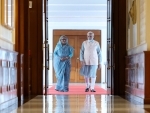Column

Bangladesh War Crimes Mastermind Ghulam Azam
Much awaited verdict of the International Crimes Tribunal – 1 (ICT-1) on the former chief of Jamaat-e-Islami (JEI) and mastermind of crimes against humanity during the Liberation War of Bangladesh in 1971, Ghulam Azam, has been delivered. The court has handed a 90 year jail term to the lynchpin of the genocide perpetrated by the marauding Pakistani army, thus drawing the curtain on a dark chapter of Bangladesh’s history.
People of Bangladesh take satisfaction from the fact that Ghulam Azam has been tried and sentenced, even though it has taken 43 years to do so. He had been an icon of all the tribulations and sufferings that the people of Bangladesh had to undergo during nine months of the liberation war.
The trial of Ghulam Azam and the judgment delivered on him are a reminder that criminals and their crimes must not be allowed to escape justice and must never be forgotten. Another lesson to be learnt is that evil may continue to live and thrive for decades, but a time will come when it will have no place to hide. The
judges observed Ghulam Azam deserved death sentence but was given prison terms due to his old age. Any order given by religious leader Azam was always considered more powerful than any Army General.
Jamaat-e-Islami (JEI) leaders have of late issued a warning to the government saying that no one in the country will remain safe should some harm befall their former chief and spiritual leader Ghulam Azam, the 1971 war crimes mastermind. “We urge the government to free our leader Ghulam Azam. No one on the soil of Bangladesh will be safe if any harm happens to him,” Selim Uddin, Assistant Secretary of Dhaka city unit of JEI said. The audacious statement constitutes an open threat to the government.
Azam was arrested and sent to jail on January 11, 2012 on charges of crimes against humanity, genocide and war crimes in 1971. There were 62 specific war crimes charges against him and all of them have been proved in the court. Azam is a high profile Islamist leader who led pro-Pakistan militias that carried out
murders, rape and various war crimes during the liberation war in 1971.
On April 4, 1971, just 10 days after the liberation war started, Azam met Gen Tikka Khan, the Pakistani general known as ‘butcher of Beluchistan and architect of the March 25, 1971 genocide’, and assured him of JEI’s full and whole hearted support in protecting ‘territorial integrity’ of Pakistan. Azam also described the liberation war as “Indian interference and infiltration” and promised all-out help to the “patriotic armed forces of Pakistan to foil India’s mischievous intentions”.
Azam organized ‘Peace Committee’ for rendering “assistance” to the Pak occupying forces in resisting the activities of the freedom fighters whom he described as “miscreants”. After carrying out genocide on 25th March, the occupying Pakistani forces lost control of erstwhile East Pakistan. To help regain control of this situation Azam set up Peace Committee that was superimposed upon the civil administration as army couldn’t rely upon the civil administration.
Peace Committee members were drawn mostly from JEI led by Azam. Peace Committee served as the agent of army, informing on civil administration as well as general public. Its members were also in charge of confiscating and redistribution of shops and lands taken away from the Hindus and freedom fighters, their relatives and friends. Almost 10 million Bangladeshis fled to India and they were looted and their properties confiscated by these elements.
The role of Peace Committee and its wings – Razakar, al Badar and al Shams – in perpetrating inhuman torture, looting and killing of innocent people, freedom fighters and intellectuals as well as raping innocent women, mostly wives, mothers and sisters of freedom fighters, in the erstwhile East Pakistan has been
well documented in various studies.
“Here in Dacca we are mute and horrified” said Archer Blood, then American Consul General and witness to the reign of terror let loose by the Pakistani occupying Army in collusion with Azam-led killers including Razakar, al Badr and al Shams. But Azam and his men were not moved with pity.
On March 25, 1971 midnight the genocide was launched. Dhaka University was attacked. Death squads roamed the streets killing more than 7000 people in a single night. Within a week more than 30,000 were killed and half the population of Dhaka fled. US Consulate in Dhaka on March 31, 1971 reported that naked
female bodies in Rokeya Hall of Dhaka University “were found hanging from ceiling fans after being raped, shot and hung by heels”. On April 13, 1971 Azam led a procession of the Peace Committee in Dhaka supporting the crack down by Pakistan army on the night of 25th March 1971 to unleash one of the ugliest genocide of the century. Azam and his followers chanted slogans—‘Long live Pakistan, Down with the Indian Imperialism’.
An account of events written by the commander of Pakistani occupation forces in 1971 exposes hollowness of JEI’s claim that there was no Razakar and they were not involved in anti-liberation activities. Lt Gen AAK Niazi, who led the Pakistani occupation forces in 1971, in his book “Betrayal of East Pakistan’
described the formation of the ‘Army of Razakar’, their training, procurement of weapons and other logistics, and deployment of the paramilitary vigilante force. To train the Razakar, a separate military directorate was set up, they were provided with machine guns, sten guns and intelligence outputs against the freedom fighters.
During the liberation war, Azam’s involvement in heinous activities can be seen in the contemporary issues of JEI mouthpiece, Dainik Sangram. Reports about his instigative speeches appearing in Dainik Sangram bear ample evidence that Azam was the mastermind of brutalities and war crimes that were to engulf the
new born country in 1971.
He has been quoted in Dainik Sangram as saying, "Pakistan is the house of Islam for Muslims of the world. Therefore, JEI activists can not justify remaining alive if Pakistan is to be disintegrated." Azam branded freedom-loving people as “rebels, secessionists and enemies of Islam as well as Pakistan.” In a
meeting organized by his party on August 4, 1971 in Khulna, Azam called upon his followers “to unite under the banner of JEI and crush the rebels and secessionists, a euphemism for freedom fighters, to establish Islamic rule in the country on the basis of the Holy Quran and Sunna.”
Addressing the party workers Azam said, “Awami League leader Sheikh Mujibur Rahman and his ‘Hindu followers’ were misguiding and instigating the people of East Pakistan by launching secessionist movement.” Azam’s provocative speeches came at a time when the Pakistan army was committing one of the worst brutalities in human history.
Azam got himself directly involved in ordering the systematic genocide on March 25, 1971. Addressing the workers at a party meeting in Dhaka on September 3, 1971, Azam said, “We need to restore normalcy in the country by physically eliminating the rebels and anti-social elements”(a reference to freedom fighters).
Describing Pakistan as the ‘abode of Islam’, Azam said in August 1971 “If the Muslims failed to safeguard the integrity and solidarity of Pakistan, the existence of the state and Islam would be at stake.”
Facing inevitable defeat, the occupation forces of Pakistan in collusion with Ghulam Azam led JEI designed a sinister scheme to intellectually cripple the country. They decided to liquidate the intelligentsia and in the last few days of the war they unleashed the most systematic execution of Bangladesh’s intellectuals. Teachers, doctors, engineers, artists, writers and other important figures of Bengali society were summarily arrested, tortured and slaughtered en masse on December 14, the day observed in Bangladesh as Martyred Intellectuals Day.
Azam fled to Pakistan soon after emergence of Bangladesh and tried his best to convince the Middle East countries not to recognize Bangladesh. After surrender of the occupation Pakistani forces on December 16, 1971 Azam continued to carry out anti-Bangladesh activities. Staying in Pakistan, he created an organization named Purbo Pakistan Punoruddhar Committee (East Pakistan Retrieval Committee). He tried to launch an international movement to reestablish East Pakistan. Accordingly he kept claiming himself as the Ameer of East Pakistan JEI many years even after the elimination of East Pakistan and
creation of Bangladesh.
In 1972, Azam formed Purbo Pakistan Punoruddhar Committee in London and conspired with others to replace Bangladesh with East Pakistan. In 1973, he lectured against Bangladesh in the annual conference of Federation of Students\' Islamic Societies held in Manchester and conference of UK Islamic Commission held in Lester. In 1974, he arranged a meeting of Purbo Pakistan Punoruddhar Committee with Pakistanis like Mahmud Ali. As they had already failed to establish a Pakistan within Bangladesh, they decided to lead their movement towards the formation of a confederation combining Bangladesh and Pakistan. In this meeting Azam explained the necessity of working for the movement within Bangladesh. In 1977 at a meeting held in the Holy Trinity Church College, Azam expressed the idea again. He came to Bangladesh in 1978 with a Pakistani passport and a three month Bangladeshi visa only to make his dream of Pakistan-Bangladesh confederation come true.
Ghulam Azam participated in the International Islamic Youth Conference held in Riyad in 1972 and fervently begged for help of all Muslim countries to reestablish East Pakistan. From 1973 to 1976 he met Saudi King seven times and asked him not to acknowledge Bangladesh and never to help this country by any means. He lectured against Bangladesh again in the international conference arranged by Rabeta-e-Alam-al-Islami in Mecca in 1974 and at King Abdul Aziz University in 1977.
Azam lobbied against the acknowledgment of new born Bangladesh in the conference of Foreign ministers of the Muslim countries held in Benghazi in 1973. In the same year he lectured in the Islamic Youth Conference held in Tripoli which was clearly against the independence and sovereignty of Bangladesh.
In 1973 Ghulam Azam urged everybody to participate in the movement of combining Bangladesh with Pakistan in the annual conference of Muslim Students\' Association of America and Canada held at Michigan. Azam lectured against Bangladesh again in 1977, in the international conference of Islamic
Federation of Students\' Organizations held at Istanbul.



